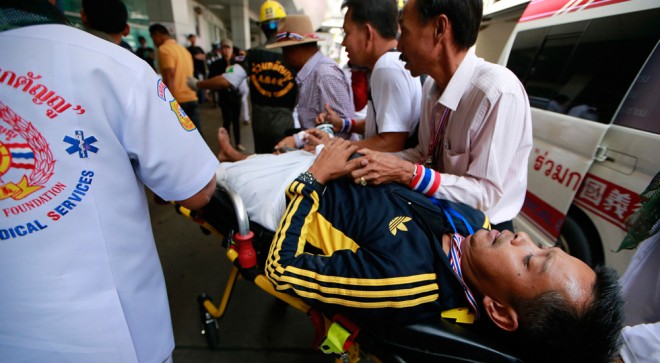Grenade blasts hit Thai protest site, wounding 28

An injured anti-government protester is wheeled on a stretcher after arriving at Rama hospital in Bangkok, Thailand, Sunday, Jan. 19, 2014. Two explosions shook an anti-government demonstration site in Thailand’s capital on Sunday, wounding at least 28 people in the latest violence to hit Bangkok as the nation’s increasingly volatile political crisis drags on. AP
BANGKOK – Twin explosions shook an anti-government demonstration site in Thailand’s capital, wounding at least 28 people in the latest violence to hit Bangkok as the nation’s increasingly bloody political crisis drags on.
Police said the blasts Sunday near Victory Monument, in the north of the city, were caused by fragmentation grenades — the same kind that killed one man and wounded dozens Friday in a similar explosion targeting protest marchers.
The demonstrators, who control several small patches of Bangkok, are vying to overthrow Prime MinisterYingluck Shinawatra’s government and derail February 2 elections she called to quell the crisis. The protest movement has refused to negotiate and the rising casualty toll has only deepened the deadlock.
Witnesses said the explosions occurred about two minutes apart. The first blast went off about 100-200 meters (yards) from a stage set up by protesters, leaving a small crater beside a shop.
The second went off near a row of vendors selling T-shirts in the street, leaving bloody clothes and a ripped white-and-blue plastic tarp scattered across the ground.
Article continues after this advertisementPolice released closed circuit camera images of the suspect that showed a man wearing a black baseball cap bag hurling one of the grenades toward a tent behind the stage. The grenade hit the roof of a small coffee shop and exploded. The suspect ran, threw a second grenade and was chased down an alley before fleeing by motorcycle.
Article continues after this advertisementAlthough the vast majority of Bangkok remains calm, political violence nearly every day over the last week has kept the city of 12 million on edge and raised fears hostilities are only just beginning.
On Friday, another grenade hurled at marching demonstrators in the city center killed one man and injured dozens. And late Saturday, a gunman opened fire on protesters in the capital’s Lad Prao district, seriously wounding a 54-year-old volunteer guard who was shot in the back.
There are conflicting theories about who is behind the unrest. Demonstrators blame the government and its supporters, who in turn accuse protesters of staging the attacks to pressure the military or judiciary to intervene — scenarios that would benefit the protest movement, which lacks the numbers to bring down the government on its own.
Sunai Phasuk, a senior researcher for Human Rights Watch, said “both sides of Thailand’s political divide use violence and spin to serve their political goals.” He added such attacks are likely to continue.
Thailand’s army has staged about a dozen successful coups since the end of absolute monarchy in 1932.
The last coup, in 2006, toppled then-Prime Minister Thaksin Shinawatra — Yingluck’s brother — and touched off a societal schism that in broad terms pits a poor rural north who back the Shinawatras against a Bangkok-based elite backed by the army and staunch royalists who see Yingluck’s family as a corrupt threat to traditional structures of power.
Yingluck’s opponents — a minority that can no longer win at the polls — argue the Shinawatras are using their electoral majority to impose their will and subvert democracy.
The crisis boiled over again late last year after the ruling party attempted to push through an amnesty bill that would have allowed Thaksin to return from self-imposed exile. Thaksin has lived abroad since 2008 to avoid a prison sentence for a corruption conviction.
Sunday’s blasts wounded 28 civilians, five of them critically, according to the Erawan Medical Center, which tracks casualties.
Police Col. Kamthorn Auicharoen, an explosive ordnance disposal officer, said intact grenade levers found at the scene indicated the explosives were Russian-built, anti-personnel RGD-5s.
A senior member of the protest movement, Sathit Wongnongtoey, condemned the bloodshed but said “condemnation is not enough … it’s the government who did it.”
Yingluck’s administration and the political movement that supports her, the Red Shirts, have denied responsibility for organizing the violence.
Anxious about triggering military intervention, Yingluck has ordered police to avoid confrontations. The strategy has undermined rule of law and the government’s authority, however, with police essentially ceding scattered pockets of Bangkok to demonstrators.
The protest movement has armed guards, and it has at times taken the law into its own hands.
Another protest leader, Issara Somchai, said demonstrators detained two men Saturday allegedly found with small homemade explosives and handcuffs. He said the men were being “investigated.”
“We are taking care of them. They are safe with us,” he said, adding they were being protected from demonstrators who could seek revenge.